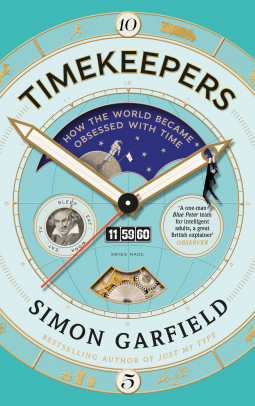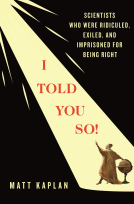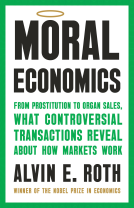
Timekeepers
How the World Became Obsessed With Time
by Simon Garfield
This title was previously available on NetGalley and is now archived.
Send NetGalley books directly to your Kindle or Kindle app
1
To read on a Kindle or Kindle app, please add kindle@netgalley.com as an approved email address to receive files in your Amazon account. Click here for step-by-step instructions.
2
Also find your Kindle email address within your Amazon account, and enter it here.
Pub Date Dec 14 2018 | Archive Date Feb 08 2018
Canongate US | Canongate Books
Description
Time flies like an arrow, but fruit flies like a banana. The Beatles learn to be brilliant in an hour and a half. An Englishman arrives back from Calcutta but refuses to adjust his watch. Beethoven has his symphonic wishes ignored. A US Senator begins a speech that will last for 25 hours. The horrors of war are frozen at the click of a camera. A woman designs a ten-hour clock and reinvents the calendar. Roger Bannister lives out the same four minutes over a lifetime. And a prince attempts to stop time in its tracks.
Timekeepers is a book about our obsession with time and our desire to measure it, control it, sell it, film it, perform it, immortalise it and make it meaningful. It has two simple intentions:
Advance Praise
SUNDAY TIMES (London) CULTURE BOOK OF THE YEAR 2016
OBSERVER (London) SCIENCE BOOK OF THE YEAR 2016
SUNDAY TIMES (London) CULTURE BOOK OF THE YEAR 2016
OBSERVER (London) SCIENCE BOOK OF THE YEAR 2016
Available Editions
| EDITION | Other Format |
| ISBN | 9781782113218 |
| PRICE | CA$23.95 (CAD) |
Average rating from 50 members
Featured Reviews
 Reviewer 446033
Reviewer 446033
Excellent work. This book provides a different perpective to most of the time management tools we use everyday. This book is Interesting and educational and the author is able to bring some humour which is fantastic
 Ayelen P, Reviewer
Ayelen P, Reviewer
This book was really interesting to read. Time and timekeeping has always been fascinating to me, but I hadn't really considered how much time has an effect on everything. When one thinks about time and how it affects daily life, one tends to think about the daily routine, what day of the week
it is (is it Friday yet?), work deadlines, how long the bus is taking, things like that. This books goes beyond all of that and shows how time affects politics, arts, culture, science, history... Everything.
Reading this book the reader will certainly learn something new and have lots to think about. There are tons of facts here that I didn't know before and found utterly interesting. I applaud the amount of research and work that went into writing this book. I've been talking about it with everyone
around me, which is a great sign that it's a book worth reading.
This book wasn't always what I expected though. Some chapters were a bit too much for me, too many details about watchmaking for example. However, even in those chapters, there's enough interesting new information and humor.
In a society obsessed with having it all and having it now, the reader would not be mad to think that we have all gone nuts after reading this and maybe we have. One thing is guaranteed, this book will make you think about it and, perhaps, it might even make you consider that it's better to appreciate the quality of time instead of running against the clock.
‘We work all hours so that we may eventually work less. We have invented quality time to distinguish it from that other time.’
Many of us are obsessed with time. People like me, for whom punctuality is a virtue of the first order, are continually dismayed and occasionally stressed by those for whom time is a relaxed, relative concept. We measure time, apportion it across the tasks we need to complete, try to allocate enough for human functions like eating and sleeping and, if there is any minute left unallocated, find some other activity with which to fill it. Or, perhaps that is just me?
‘Timekeepers’ was a perfect read for me. It gave me some insight into how (and why) we’ve become fixated on increasingly accurate measures of time. I learned about the French Revolutionary Calendar (and having read about it, can understand why I’d never heard of it before), found out more about the art and science involved in watchmaking than I’ll ever need to know, and wondered about the timing that Beethoven really wanted for his 9th Symphony.
Mr Garfield has included a lot of interesting information in this book. While I knew about US Senator Strom Thurmond’s 24 hour 18 minute speech in August 1957, I didn’t know that the Beatles recorded their first LP (excluding the singles) in less than one day in 1963. There is information as well about developments in recording music: those of us old enough to have heard recordings on the old 78 rpm records will know how much has changed!
‘Time once passive is now aggressive. It dominates our lives in ways that the earliest clockmakers would have surely found unbearable.’
As I read this book, I wondered about a few aspects of timekeeping. When did accuracy become so important? Was it necessary before the advent of train timetables? Has increasingly accurate measure of time driven timetabling, or is it the other way around? Is the level of accuracy in timekeeping required for (say) aircraft and train scheduling as important in other aspects of life?
I was reminded, too, how time can feel different. If you’ve waited in an emergency ward, or waited for a telephone call, minutes can feel like hours. If you’ve been in an accident, it often feels like everything is happening in slow motion. On the other hand, if you’ve been to an enjoyable event, hours seem to pass like minutes. Yes, I guess that time can be relative as well as absolute.
I really enjoyed this book, and would recommend it to anyone with an interest in time, and how we measure it.
Note: My thanks to NetGalley and Canongate Books for providing me with a free electronic copy of this book for review purposes.
Jennifer Cameron-Smith
 Jill F, Reviewer
Jill F, Reviewer
I admit it. I am obsessed with time. I am retired (sort of) and have been since my company was bought out in 2009 and I decided (at the ripe old age of 36) that I didn't want to undergo complete life upheaval to work for a vast behemoth in a vast city. Since then I've moved back to the area where I grew up, gotten married, gotten two bonus kids in the bargain, and had a child. I stay at home - which is to say I'm never home, I'm always driving someone somewhere or fetching something forgotten and delivering it or shopping for something we've run out of yet again. But in theory, my day is less regulated than it ever was - yet I'm more obsessed with time than I ever was at any point in my career in office buildings.
Weird, to say the least. But apparently, I'm not the only one - as this delightful collection of stories, anecdotes, and life lessons couched as stories and anecdotes informed me. Through a series of exceedingly interesting and seemingly random tales about the relationship between people and time, Simon Garfield has managed to simultaneously make me more comfortable with my obsession and more worried about it - in the best possible way in both regards. This is an entertaining, well-written, collection of fun facts and thought-provoking ideas, and was an excellent find.
 Alexis A, Reviewer
Alexis A, Reviewer
Time is something we take for granted. Clocks work because they always have; calendars are obvious. This book provides an opportunity to question the things we take for granted. The nature of time is obviously something that can be too complicated and mathematical to think of, or philosophically exhausting, but the author approaches the topic with anecdotes that are easy to follow and interesting. Some chapters include things I didn't know like watch construction, or how revolutionary France changed clocks and calendars, while others everyone knows about, like time slowing when disaster strikes. This was really thought provoking and well argued. The tone is humorous, and light for a book about time, and will leave you more conscious of how society, history and people personally view something as difficult to grasp as time.
 catherine h, Reviewer
catherine h, Reviewer
This looked cover made the book so intriguing I had to take a peek! And I am glad I did. I am still reading the book, but have been bouncing around between stories that have caught my eye. I loved the Revolver chapter on the Beatles! Lennon and McCartney were brilliant songwriters (imo) , but this chapter just blew me away! The Life is Short chapter was a fun read as was Slowing Down the World and White People Are Crazy. Just too entertaining with lots of food for thought. BTW check out John cages 4'33 on Youtube- it's a hoot!
Garfield writes a easy read, smoothly transitioning between his explorations of how we observe, mark, display, portray, are influenced by, and bound to time. From faster ways of getting to one place from another (speed records of trains in the 19th century), timing of Beethoven's symphonies, breaking a four minute "barrier" (I detest that term in its colloquial context, but whether sensational or lazy on the part of writers, it's a common fallback) for a human mile-runner, time management, movie-making, historically long speeches...there's something here that should interest just about anyone. Of course, there are elements that are not of interest to everyone (which some readers/reviewers lazily identify themselves as "bored") - details of watchmaking probably don't hold as much fascination for others as they do for me.
I think there is a good deal more exploration and Garfield did a very good job with his.
 Phil S, Reviewer
Phil S, Reviewer
“We work all hours so that we may eventually work less,” points out Simon Garfield in his book 'Timekeepers: How the World Became Obsessed With Time'. We are often at odds trying to reconcile these two extreme points of view: according to Garfield the most commonly used noun in the English language is time. He spends part of the first part of 'Timekeepers' pointing out how much we have structured our language and society around time and concepts of time. The condition of “nostalgia” is actually considered a serious affliction in the middle of the 19th century: a disease associated with time.
The first widespread need for cities to keep a common clock was with the advent of the railroads. Timetables listing departure and arrival times linked cities that previously would set their clocks based on local noon, or some other independent standard. The “aggression” of imposing London time on other parts of the country was met with resistance but ultimately of course lost out. The US was far worse, with almost 50 different time standards across the country. These early differences are in sharp contrast to an airport delay described in a later chapter, caused by adding a single second (a leap-second) to June 30.
Following the history of railroad timetables is a far more fascinating discussion of metronome markings in classical music, the metronome being a new invention at the time Beethoven was composing his Ninth Symphony. Although precise metronome markings should make an interpretation today far more exact, these markings have actually been the root of controversy ever since. Also interesting is Garfield’s short stint in Swiss watchmaking, including the requirements for a “Swiss watch,” and the perspective of individuals that resent the closed-shop environment it creates. As a continuation of his hands-on approach, the author spends time on a MINI car production line, produced using Just-In-Time principles.
Other topics covered in 'Timekeepers' include museum artifacts that mark time, and the setting of the well-known doomsday clock. These topics seem to be straying away from the theme of timekeeping precision (or timekeeping obsession) to a more abstract concept of time: time immemorial. Nick Ut’s famous picture of a Vietnamese girl fleeing a napalm attack is also covered, but it is not clear specifically what this has to do with time. These meanderings aside, Garfield has provided a welcome journey of a few hours’ duration through both well-traveled and less familiar paths.
Readers who liked this book also liked:
Alvin E. Roth
Business, Leadership, Finance, Health, Mind & Body, Politics & Current Affairs


















